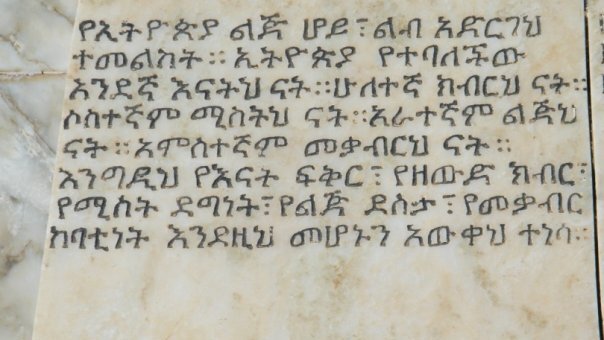
Kursinhalt
Amharic is the so-called "Working Language" of Ethiopia. Spoken as a native language by more than 30 million people and as a second language by more than 20 million more, it is widely acknowledged as the lingua franca of Ethiopia. It was the official language of the Ethiopian kingdom (or: language of the king, ልሳነ ነጉሥ in Ge'ez) from the 12th century until the 20th century. It is one of many Semitic languages spoken in Ethiopia, notably closest to Argobba and sharing similarities on a descending scale with Gurage languages, Harari and non-South Ethio-Semitic (namely Tigrinya and Tigre).
In the course, we will make ourselves familiar with the script and learn the basic grammar of Amharic. The Amharic grammar and syntax are very different from many other Semitic languages, especially ones not spoken in Ethiopia or Eritrea. It is also distinguishably distant from Ge'ez, also called Classical Ethiopic. Though it has borrowed many words and even structures from Ge'ez, Amharic and South Ethio-Semitic in general is thought to be descended from a sister language of Proto-Ge'ez and certainly not from Ge'ez (or Proto-Ge'ez) itself. It also presents significant influence from Cushitic languages and the so-called Ethiopian Sprachbund.
Like other Ethio-Semitic languages, Amharic utilizes the Ge'ez script with slight additions. This is a syllabary or, more accurately, an Abugida script, in which every character signifies a consonant and a vowel. The different vocalic adjustments of the onset consonant character are named "orders".
In the course, we will have a taste of Amharic grammar through learning the verbal conjugation and basic morphology, and reading and analyzing sentences for acquiring basic vocabulary.
Kursdetails
- Winter term 2024/25, Tuesdays, 2–4 p.m.
- Course starts October 15, 2024
- Hybrid course. For registration, please contact the instructor.
- Regular attendance is a prerequisite for admission to the exam
- Written exam
- 5 ECTS
A written exam can be done after the course. If you are not a student at Friedrich-Schiller-University Jena, and wish to do an exam, we will contact your home institution and find someone who will proctor the exam there. We will send them the exam by mail. It is the participant’s responsibility, however, to check if the course can be accredited for his / her study program.
Materialien
-
Textbook and dictionaries
- W. Leslau, Amharic Textbook, Wiesbaden 1967.
- W. Leslau, Concise Amharic Dictionary, Wiesbaden 1976.
- W. Leslau, Reference Grammar of Amharic, Wiesbaden 1995.
- T. L. Kane, Amharic-English Dictionary, Wiesbaden 1990.
- W. Leslau and T. L.Kane, Amharic Cultural Reader, Wiesbaden 2001.
-
The writing system
-
Additional material